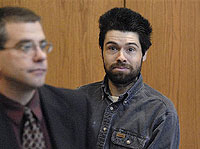White hunter imprisoned for 69 years for killing Hmong while squirrel hunting
A white hunter who was charged with killing a Hmong man while squirrel hunting was sentenced to 69 years in prison, maximum possible punishment.

Prosecutors said prejudice was James Nichols' true motive in shooting Cha Vang and stabbing him five times in the neck. He was recorded in police interviews as saying that Hmong people are bad, mean and "kill everything and that they go for anything that moves."
In court Wednesday, Nichols turned to Vang's widow, Pang Vue, and said, "I am very sorry for what happened." She bent over, put her face in her hands and began to weep.
Nichols paused, then added, "It has all been emotional for us, and I am greatly sorry for that."
The 29-year-old Peshtigo man's apology had less effect on Marinette County Circuit Judge David Miron: "Frankly, I think it is too little too late," he said.
Nichols, a onetime sawmill worker, was convicted last month of second-degree intentional homicide, hiding a corpse and being a felon in possession of a firearm in Vang's death.
The body of the Green Bay man, a 30-year-old father of five, was found hidden under a log Jan. 6 in a wildlife refuge where he and Nichols had been hunting separately.
The death rekindled racial tensions in northwest Wisconsin, where a Hmong deer hunter fatally shot six white hunters during a confrontation three years ago. Chai Soua Vang of St. Paul, Minnesota - no relation to Cha Vang - is serving life sentences.
In arguing for the maximum sentence for Nichols, prosecutor Roy Korte called Cha Vang a quiet, kind and loving man killed for "no good reason, other than anger and hate."
Miron said Nichols' actions were "very scary" and noted his history of violence, juvenile record and previous conviction for burglary.
"It tells me you are a dangerous person," the judge said. "The community needs as much protection as it can possibly get. The best we can do is make sure you can never do harm again."
Korte said Nichols has "essentially a life sentence."
Defense attorney Kent Hoffmann, who had sought a 15-year prison sentence, said Nichols will appeal.
Sheriff's deputies arrested Nichols after he went to a hospital Jan. 5 with a .22-caliber bullet lodged in his right hand and an injury to his other hand - about the same time members of Vang's hunting party reported him missing.
Nichols did not testify during his weeklong trial, but the jury heard tape recordings in which he told law enforcement officials he acted in self-defense after Vang shot him. Nichols said the fight started after he told Vang to leave because he was interfering with his hunt.
Nichols said he ducked behind a tree and took a "wild shot" at Vang with a shotgun. He said Vang shot him again before Nichols rushed him, took away his gun and stabbed him in the neck with a pocketknife.
Nichols' father, Dan, told the judge he believed his son acted in self-defense.
"I certainly would have defended myself as best I could, even if it meant taking another man's life," Dan Nichols said.
Miron joined prosecutors in rejecting the defendant's version of events.
"I believe he did fire a shot at you, but it was in response to yours," the judge told James Nichols. "I am sorry, but I can't believe anything you say as far as what happened with this incident."
Vue, Vang's widow, submitted a statement that was read before Nichols was sentenced. She called him "heartless" and said she has found it difficult to perform even simple household duties since her husband of 13 years died.
"I've been an emotional wreck and often time suffered from blackouts because I cannot comprehend why James Nichols decided to take the life of my husband," she wrote. "I see myself stuck in a dark tunnel and I cannot see the light."
Vang's uncle Kou Vang, of St. Paul , said the family was "very, very pleased" with the sentence but added, "It is of little consolation to us.
"Mr. Nichols can go outside. He can feel the wind blow," Vang said and broke into tears. "He can see his family. He can talk to his family. But ours is gone forever."
Cha Vang was born in Laos , fled to a refugee camp in Thailand and immigrated to the U.S. with his family in 2004.
Several hundred thousand Hmong fled Laos for the United States after the communists seized control in 1975 following the Vietnam War. Many settled in Minnesota and Wisconsin.
Subscribe to Pravda.Ru Telegram channel, Facebook, RSS!




